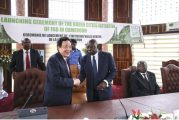Categories
Recent Posts
- Biya regime delays bond sale amid regional market strain
- Historic agreement between Nigeria and Cameroon to tackle wildlife crime
- Southern Cameroons refugees in Nigeria receive farm seedlings
- Douala: Investment Forum wraps up with honors for investment champions
- Understanding the Biya Francophone regime’s support for the Israeli genocide in Gaza
Archives
- April 2024
- March 2024
- February 2024
- January 2024
- December 2023
- November 2023
- October 2023
- September 2023
- August 2023
- July 2023
- June 2023
- May 2023
- April 2023
- March 2023
- February 2023
- January 2023
- December 2022
- November 2022
- October 2022
- September 2022
- August 2022
- July 2022
- June 2022
- May 2022
- April 2022
- March 2022
- February 2022
- January 2022
- December 2021
- November 2021
- October 2021
- September 2021
- August 2021
- July 2021
- June 2021
- May 2021
- April 2021
- March 2021
- February 2021
- January 2021
- December 2020
- November 2020
- October 2020
- September 2020
- August 2020
- July 2020
- June 2020
- May 2020
- April 2020
- March 2020
- February 2020
- January 2020
- December 2019
- November 2019
- October 2019
- September 2019
- August 2019
- July 2019
- June 2019
- May 2019
- April 2019
- March 2019
- February 2019
- January 2019
- December 2018
- November 2018
- October 2018
- September 2018
- August 2018
- July 2018
- June 2018
- May 2018
- April 2018
- March 2018
- February 2018
- January 2018
- December 2017
- November 2017
- October 2017
- September 2017
- August 2017
- July 2017
- June 2017
- May 2017
- April 2017
- March 2017
- February 2017
- January 2017
- December 2016
- November 2016
- October 2016
- September 2016
- August 2016
- July 2016
- June 2016
Featured
 Understanding the Biya Francophone regime’s support for the Israeli genocide in Gaza
Understanding the Biya Francophone regime’s support for the Israeli genocide in Gaza  Poverty under Biya: Cameroonians embrace Chinese language for brighter futures
Poverty under Biya: Cameroonians embrace Chinese language for brighter futures  Cameroon is broken: Who can fix it?
Cameroon is broken: Who can fix it?  Ethiopia: U.S Senator Cardin Statement on the Killing of Bate Urgessa
Ethiopia: U.S Senator Cardin Statement on the Killing of Bate Urgessa  Battle for the Unity Palace: ANNOUNCEMENT!
Battle for the Unity Palace: ANNOUNCEMENT!
Most Commented Posts
 4 Anglophone detainees killed in Yaounde
4 Anglophone detainees killed in Yaounde
19 comments Chantal Biya says she will return to Cameroon if General Ivo Yenwo, Martin Belinga Eboutou and Ferdinand Ngoh Ngoh are sacked
Chantal Biya says she will return to Cameroon if General Ivo Yenwo, Martin Belinga Eboutou and Ferdinand Ngoh Ngoh are sacked
13 comments Anglophone Nationalism: Barrister Eyambe says “hidden plans are at work”
Anglophone Nationalism: Barrister Eyambe says “hidden plans are at work”
12 comments The Anglophone Problem – When Facts don’t Lie
The Anglophone Problem – When Facts don’t Lie
12 comments Largest wave of arrest by BIR in Bamenda
Largest wave of arrest by BIR in Bamenda
10 comments
Latest Tweets
Featured
-

Biya regime delays bond sale amid regional market strain
-

Historic agreement between Nigeria and Cameroon to tackle wildlife crime
-

Southern Cameroons refugees in Nigeria receive farm seedlings
-

Douala: Investment Forum wraps up with honors for investment champions
-

Understanding the Biya Francophone regime’s support for the Israeli genocide in Gaza
-

US: Prosecution lays out ‘criminal conspiracy’ as Trump’s hush money trial opens
-

FAO formally launches Green Cities Initiative in Cameroon
© Cameroon Concord News 2024
3, March 2017
Sudan’s Bashir appoints first premier since 1989 coup 0
Sudan’s President Omar al-Bashir has appointed a prime minister for the first time since the post was abolished following a coup in 1989. Bakri Hassan Saleh, 68, took the oath of office at the presidential palace in Khartoum on Thursday, a day after he was named as prime minister by the executive bureau of the president’s National Congress Party (NCP).
A close confidante of Bashir, Saleh has served in several ministerial portfolios in the Sudanese government, including interior and defense. The army general, who is known as “Bashir’s shadow,” was head of Sudan’s all powerful National Security and Intelligence Service in the 1990s.
Saleh was an influential military officer in the 1989 coup which brought Bashir to power. He has been a key aide to Bashir and served as first vice-president, a post he will continue to occupy in the future.
The appointment is part of reforms proposed by a year-long national dialogue between the Sudanese government and some opposition groups.
Bashir, who has faced criticism over his way of dealing with dissent, concluded in October last year a national dialogue involving his government and several opposition groups. The main aim of the initiative is to resolve insurgency in Sudan’s border regions and heal the country’s crisis-wracked economy.
Bashir scrapped the post of prime minister after he launched the 1989 coup against then premier Sadiq al-Mahdi. Lawmakers approved constitutional amendments last year while Mahdi returned to Sudan from a two-year exile last month. The post of prime minister was created by constitutional amendments.
Many say the appointment of a new prime minister would help Bashir revive his decades-old rule and give it a new look. Khaled Tigani, a senior journalist, said Sudan would hardly differ under Saleh’s premiership as it would be a continuation of Bashir’s rule.
“General Bakri’s appointment is broadly a continuation of Bashir’s rule rather than a new chapter in Sudan’s politics,” he told AFP, adding, “But at the end of the day it depends on the leadership that General Bakri manages to show.”
Saleh said in a brief statement after taking oath that his cabinet would represent various political forces. “Our country is at a historic moment as it harmonizes all political parties and powers who participated in the national dialogue,” Saleh said.
Presstv